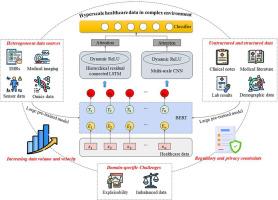Large model-driven hyperscale healthcare data fusion analysis in complex multi-sensors
IF 14.7
1区 计算机科学
Q1 COMPUTER SCIENCE, ARTIFICIAL INTELLIGENCE
引用次数: 0
Abstract
In the era of big data and artificial intelligence, healthcare data fusion analysis has become difficult because of the large amounts and different types of sources involved. Traditional methods are ineffective at processing and examination procedures for such complex multi-sensors of hyperscale healthcare data. To address this issue, we propose a novel large model-driven approach for hyperscale healthcare data fusion analysis in complex multi-sensor multi-sensors. Our method integrates data from various medical sensors and sources, using large models to extract and fuse information from structured and unstructured healthcare data. Then, we integrate these features with structured data using a hierarchical residual connected LSTM network, enhancing the model's ability to capture local and global context. Furthermore, we introduce a dynamic ReLU activation function and attention mechanism that allow us to adjust the depth of our networks dynamically while focusing only on relevant information. The experiments on MIMIC-III and eICU-CRD datasets demonstrate the superiority of the proposed method in terms of accuracy, efficiency, and robustness compared to state-of-the-art methods. Therefore, the proposed method provides valuable insights into the potential of large model-driven approaches for tackling the challenges of hyperscale healthcare data fusion analysis in complex multi-sensors.

复杂多传感器中的大型模型驱动超大规模医疗数据融合分析
在大数据和人工智能时代,医疗数据融合分析因涉及的数据源数量大、类型多而变得困难重重。对于这种复杂的多传感器超大规模医疗数据,传统方法在处理和检查程序方面效果不佳。为解决这一问题,我们提出了一种新型的大型模型驱动方法,用于复杂多传感器的超大规模医疗数据融合分析。我们的方法整合了来自各种医疗传感器和来源的数据,使用大型模型从结构化和非结构化医疗数据中提取和融合信息。然后,我们使用分层残差连接 LSTM 网络将这些特征与结构化数据进行整合,从而增强模型捕捉局部和全局上下文的能力。此外,我们还引入了动态 ReLU 激活函数和关注机制,使我们能够动态调整网络深度,同时只关注相关信息。在 MIMIC-III 和 eICU-CRD 数据集上的实验表明,与最先进的方法相比,所提出的方法在准确性、效率和鲁棒性方面都更胜一筹。因此,所提出的方法为大型模型驱动方法应对复杂多传感器超大规模医疗数据融合分析挑战的潜力提供了宝贵的见解。
本文章由计算机程序翻译,如有差异,请以英文原文为准。
求助全文
约1分钟内获得全文
求助全文
来源期刊

Information Fusion
工程技术-计算机:理论方法
CiteScore
33.20
自引率
4.30%
发文量
161
审稿时长
7.9 months
期刊介绍:
Information Fusion serves as a central platform for showcasing advancements in multi-sensor, multi-source, multi-process information fusion, fostering collaboration among diverse disciplines driving its progress. It is the leading outlet for sharing research and development in this field, focusing on architectures, algorithms, and applications. Papers dealing with fundamental theoretical analyses as well as those demonstrating their application to real-world problems will be welcome.
 求助内容:
求助内容: 应助结果提醒方式:
应助结果提醒方式:


